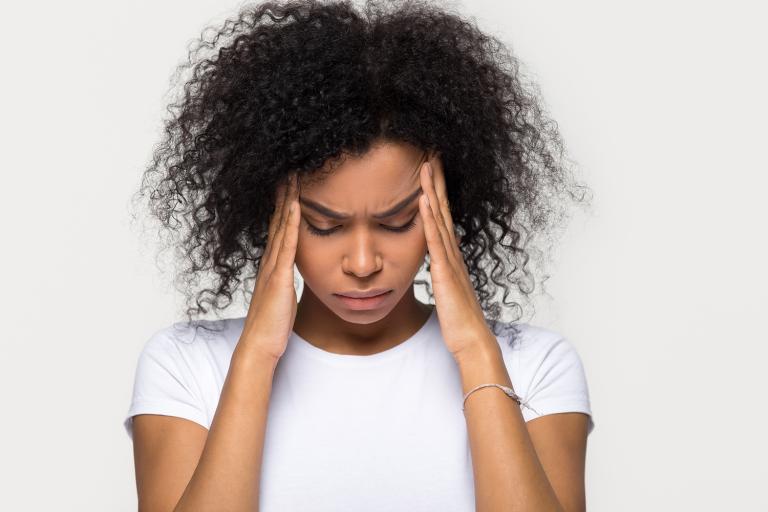To be human, it seems, means to have headaches. If the $4 billion Americans spend on over-the-counter (OTC) pain pills is any indication, a lot of us fend off headaches fairly regularly.
It's important to figure out which kind of headache you are experiencing, and find the right relief.
No matter what kind of headaches you get, headache experts find that clean living can go a long way in heading off future headaches.
You’ve heard it before, but it doesn’t hurt to review it:
- get regular sleep
- exercise regularly
- eat healthy meals
Types of Headaches
Scientists classify headaches into three major categories:
- primary headaches
- secondary headaches
- cranial neuralgias
Headache sufferers may also classify them into three categories: nasty, nastier, and with a nod to Bruce Springsteen, “freight train running through the middle of my head.”
Primary headaches include migraines, tension headaches cluster headaches, as well as others.
-
Tension Headaches
The most common type, brought on by physical or emotional stress, are experienced by as many as 90 percent of adults.
About 80 percent of headaches are tension headaches. These generally respond well to OTC pain medications such as acetaminophen or aspirin. Although a tension-type headache isn’t disabling—most people can keep doing what they need to during the day—it’s annoying.Triggers
Stress is the biggest cause. The most obvious answer is perhaps the best one: relax.
Try practicing yoga, meditation, or biofeedback-assisted relaxation.
It also helps to be mindful of other potential triggers:
- too little sleep
- dehydration
- caffeine overuse
- skipping meals
Remedies
-
Vitamin D
It’s possible that your headaches aren’t from stress, but instead due to vitamin D deficiency. Research checking blood levels of vitamin D and noting headache frequency of each person found that being in the low vitamin D group showed strong crossover with also being in the high-frequency headache group.
Vitamin D deficiencies rank as one of the more common vitamin deficiencies, especially in the fall and winter. This is because vitamin D can be made by the skin by the action of sunlight. It’s prudent to focus on dietary (and perhaps supplemental) sources of vitamin D, at least for the non-sunny parts of the year.
-
Topical Peppermint Oil
A pleasant-smelling way to relieve tension headache pain comes in the form of topical peppermint (Mentha piperita) oil. When people with tension headaches apply peppermint oil or placebo, the peppermint group gets relief. The topical peppermint even relieves headache pain as well as aspirin and other OTC pain relievers
-
Migraine Headaches
Disabling pain that interferes with daily living is one of the things that define a migraine. Women are three times as likely as men to get migraines. OTC pain relievers help ease the pain, but many people with migraines end up needing prescription medication.
Triggers
Find Triggers by Keeping a Diary
A headache diary with notes about your headaches and your diet can reveal patterns and connections with your migraines. What triggers a migraine varies quite a bit, but these are good starting points:
- oversleeping
- undersleeping
- skipping meals
- alcohol
- emotional stress
A headache diary will also reveal any connections to your menstrual cycle. So-called “menstrual migraines” strike each month around the time of a woman’s period due to falling estrogen levels.
Common Food Triggers
With most food triggers, you’ll know within a couple of hours if there is a connection, although chocolate and caffeine can take longer to trigger a headache.
- red wine
- draft beer
- aged cheese
- garlic
- onion
- chocolate
- caffeine
Remedies
-
Butterbur
Butterbur (Petasites hybridus) is sometimes called purple butterbur or sweet coltsfoot.
Some studies have shown it to be effective in reducing the frequency of migraine headaches by as much as 50 to 60 percent after taking a standardized butterbur extract.
Because butterbur contains liver-toxic substances called pyrrolizidine alkaloids (PA), it should only be used in commercially prepared forms labeled PA-free.
-
Feverfew
The herb feverfew (Tanacetum parthenium) has been shown to ease the frequency, severity, and duration of migraine attacks.
Keep in mind that it’s not an instant cure. This anti-inflammatory herb works better if taken regularly to gradually reduce migraine days as opposed to taking it in the midst of a migraine.
Take this herb daily for at least four to six weeks before expecting protection against migraines.
Studies on Feverfew
A German study found that migraine sufferers given a CO2-based extract of feverfew had significantly fewer migraine headaches after taking this extract three times a day for 16 weeks.
Other research has shown that carbon dioxide extract of feverfew decreased the frequency of migraine attacks from 4.76 per month to 1.9 per month.
Other research describes a three-month trial in which a combination of feverfew with magnesium and vitamin B2 provided a 50 percent decrease in migraine attacks.
-
Peppermint Oil
Peppermint (Mentha piperita) essential oil has been shown to provide relief from migraines.
This anti-inflammatory herb works better if taken regularly to gradually reduce migraine days as opposed to taking it in the midst of a migraine.
One study showed a significant reduction in reducing or eliminating headache pain altogether when a peppermint solution was applied to the forehead, helping tense muscles to relax and release their painful grip.
Mix essential oils with a vegetable-based carrier oil before applying them directly to the skin.
-
White Willow
White willow (Salix alba) dates as far as back as 400 BC, when Hippocrates touted the pain-relieving effects of willow bark.
This anti-inflammatory herb works better if taken regularly to gradually reduce migraine days as opposed to taking it in the midst of a migraine.
Some 2,200 years later, Henri Leroux, a French pharmacist, managed to crystallize the extract (salicin) leading to the invention of salicylic acid, commonly known today as aspirin.
Studies show that willow can be as effective as aspirin for relieving pain. For some people, it’s also less likely to produce gastrointestinal side effects such as upset stomach.
-
Magnesium
In addition, research shows that many headache sufferers run low when it comes to the mineral magnesium.
For women with menstrual migraines, taking magnesium supplements every day for a week or two prior to each month’s period can reduce the number of headaches.
-
B Vitamins
B vitamins also deserve consideration when it comes to migraine prevention.
Those who experience frequent migraines can reduce their occurrence and severity with daily supplementation of folic acid (5 milligrams) combined with vitamin B6 (80 milligrams).
-
Yoga
An eight-week meditation and yoga program led to fewer and shorter migraines in a group of adults. The migraines also tended to be less severe, and participants felt a greater sense of control over their headaches.
The adults attended eight weekly classes to learn mindfulness-based stress reduction. They also practiced on their own for 45 minutes at least five additional days per week.
“Stress is a well-known trigger for headaches, and research supports the general benefits of mind/body interventions for migraines,” said Wake Forest University professor Rebecca Wells, MD.
-
Other Types and Causes
-
Caffeine Withdrawal
Caffeine addicts can get a headache about a day after their last dose. A cup of coffee will solve the problem.
-
Cluster Headaches
Cluster headaches have most of the pain around one eye, have a rapid onset, and reoccur in clustered groups for days, weeks, or months until a remission period. Smoking is a risk factor for these headaches and they are more common in men.
-
Dehydration
Dehydration can trigger a headache. Remedy by drinking water.
-
Eyestrain
Too much computer work can trigger a headache. Resting your eyes several times an hour and possibly getting prescription glasses geared toward computer use can solve the problem.
-
Rebound Headaches
Taking OTC painkillers too often can result in a “medication overuse” or rebound headache. Avoid this trouble by limiting analgesic use to no more than twice a week.
-
Sinus Headaches
This headache develops as a result of a sinus infection. The pain is centered around the eyes and cheeks, and worsens when bending over. These headaches are rare; many supposed cases of sinus headache are migraines.
-
Thunderclap Headaches
A sudden and severe headache, often described as the worst headache possible, could signal a life-threatening condition, such as a stroke or aneurysm; seek immediate medical attention.
-

